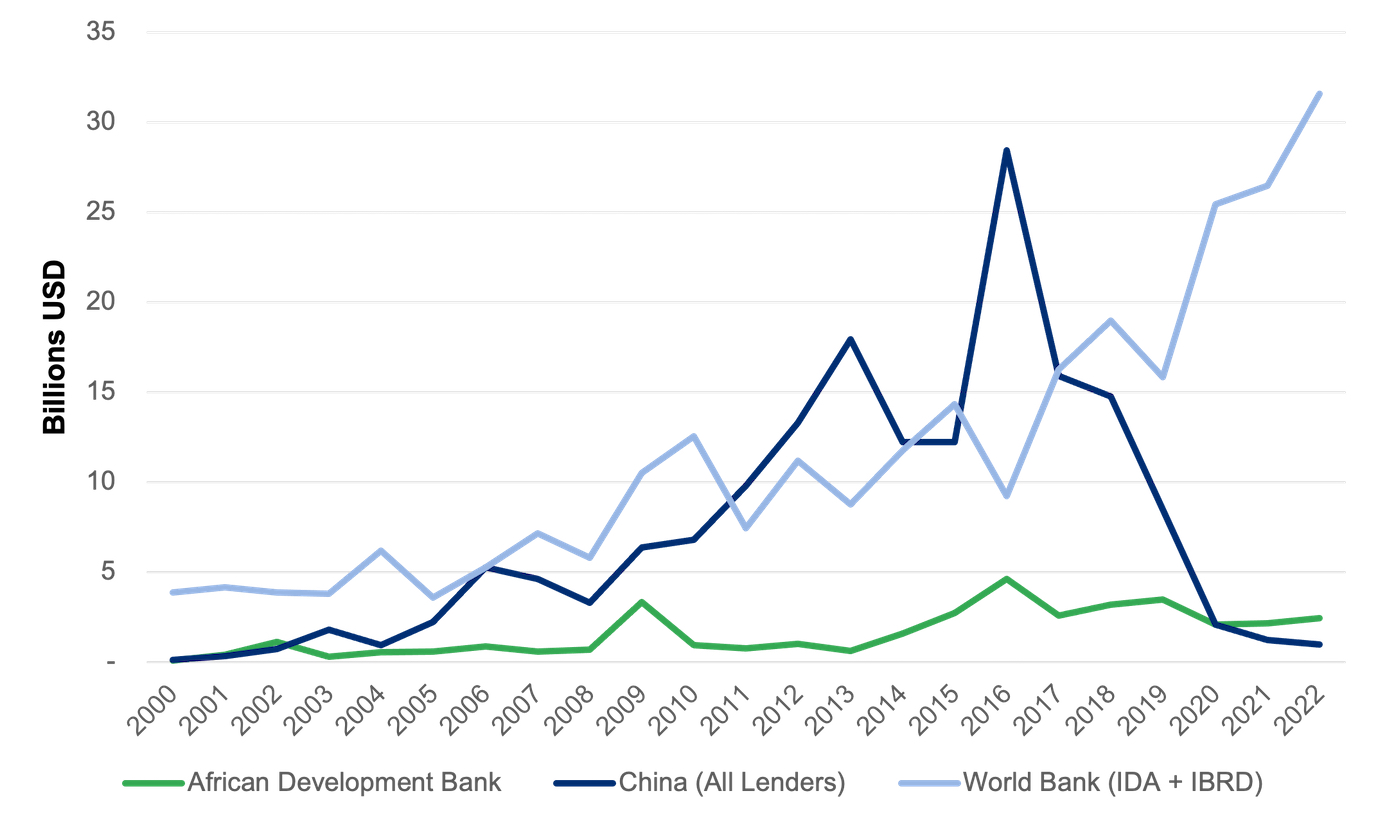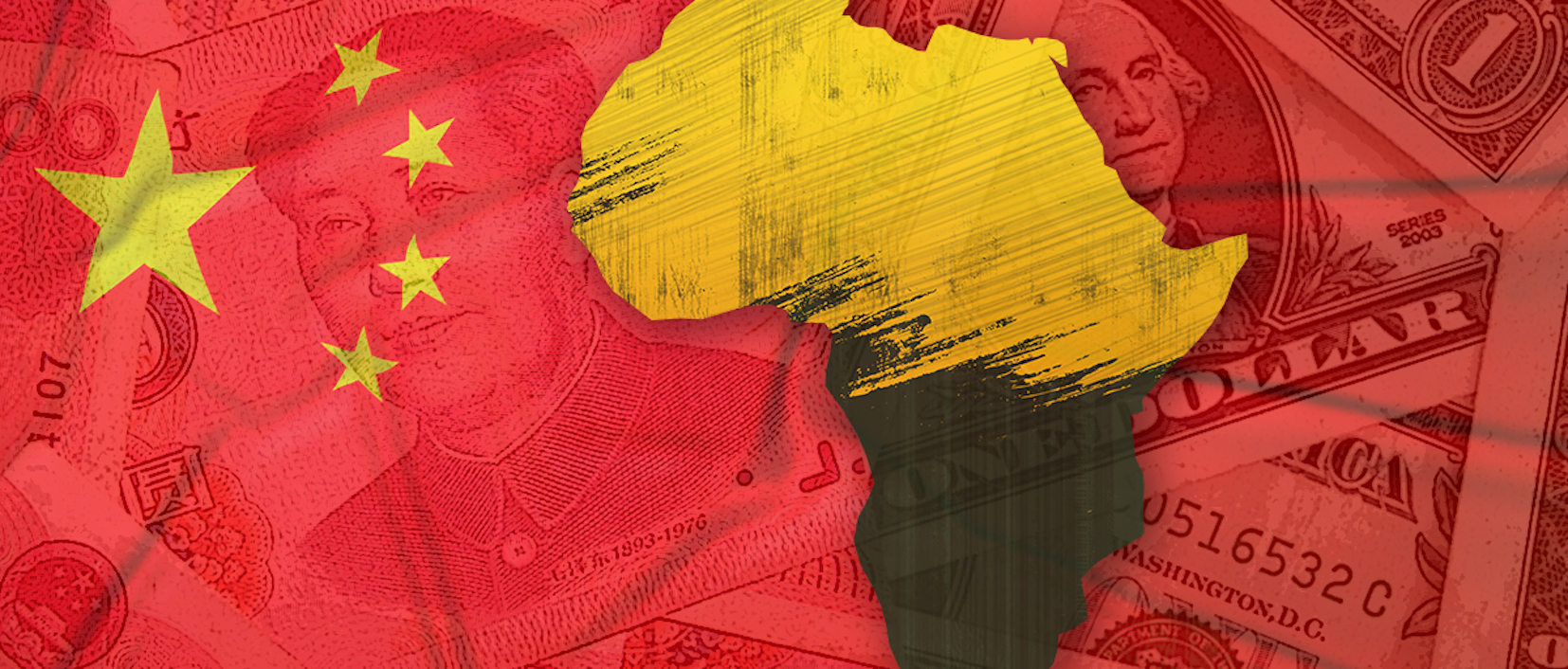Africa’s mounting debt crisis could undermine the continent’s economic progress and stability. The problem has worsened with the economic fallout of the Covid-19 pandemic, the war in Europe and the impacts of climate change. The current debt situation in Africa has reached alarming proportions and could have severe consequences for human security.
Public debt in Africa surged to a staggering $1.8-trillion by 2022, representing a 183% increase since 2010. What is even more concerning is that this rate is nearly 300% higher than Africa’s gross domestic product (GDP) growth rate during the same period. As a result, the debt-to-GDP ratio in many African nations is projected to exceed 60% in 2023, signifying a potential imbalance that will make it difficult for governments to manage their financial resources.
China has been a pivotal lender in Africa, extending loans exceeding$170-billion to 49 African countries and regional institutions between 2000 and 2022. New Institute for Security Studies (ISS) research sought to unpack Africa’s debt dilemma and understand China’s role better. The study found that while China wasn’t the primary cause of the debt crisis, there were concerns about a lack of transparency, clauses impacting local industries, and the absence of collective restructuring options in Chinese loan contracts.
Comparison of sovereign loans to Africa from China, the World Bank and African Development Bank
 Source: Boston University Global Development Policy Center
Source: Boston University Global Development Policy Center
Chinese loans have played a pivotal role in financing infrastructure projects and stimulating economic growth in many African countries. However, recent trends indicate a reduction in these loans due to a range of factors, including Covid-19 and evolving Chinese priorities.
Chinese lending has often been associated with the narrative of “debt trap diplomacy”. The term was coined by an Indian think tank in 2017 and spread through Western governments, media and intelligence circles. The term suggests that China may use its loans to ensnare African countries in unsustainable debt burdens, potentially leading to a loss of sovereignty. While these claims are hotly disputed and have been disproven, some of China’s lending patterns require closer examination.
A lack of transparency also affects infrastructure projects funded by Chinese loans. Many don’t go through public tender processes, raising the risk of corruption, especially in nations with weak governance structures.
Loans from China differ from those of Western institutions like the World Bank and the International Monetary Fund (IMF). Research by AidData found that Chinese state-owned lenders, driven by profit motives, often include conditions in loan agreements that can strain already fragile African economies. These include the prohibition of collective restructuring and the inclusion of extensive confidentiality clauses. Such terms can limit borrowing nations’ ability to make independent and sovereign financial decisions.
Read more in Daily Maverick: South Africa’s strange obsession with China is proof that it’s a cheap date
A lack of transparency surrounding Chinese loans is another major concern. Government transparency is crucial for financial interactions with external creditors, since it ensures accurate information reaches both markets and citizens. However, the rise in “hidden debt” from Chinese state-owned banks complicates the estimation of debt levels, posing a serious challenge for financial management and accountability.
A recent study estimated that half of Chinese loans in sub-Saharan Africa are not disclosed in sovereign debt records. It’s worth noting that this opacity extends beyond Chinese lending, as concerns also arise regarding Western private-sector loans.
A lack of transparency also affects infrastructure projects funded by Chinese loans. Many don’t go through public tender processes, raising the risk of corruption, especially in nations with weak governance structures. This lack of disclosure can lead to social tensions and anti-Chinese sentiment, further complicating the debt crisis.
The rise of anti-Chinese sentiment in countries such as Ghana, Zambia and Zimbabwe has been used by politicians to gain electoral support. When the terms of agreements are not publicly available, separating fact from fiction becomes a daunting task.
While Chinese loans have been vital for financing development, concerns about transparency, collateral agreements and their impact on African sovereignty cannot be ignored.
Concessional loans, often directed towards infrastructure projects, play a significant role in China’s engagement with Africa, and have helped reduce the continent’s infrastructure gap. These loans have more favourable terms than standard commercial loans, but can present their own challenges. Lending contracts often stipulate that Chinese state-owned enterprises are primary contractors for the projects, which can suppress the development of local industries and introduce other problems.
Certain elements in Chinese loan contracts can pose significant collateral risks and hinder the financial flexibility of African countries. A case in point is the Entebbe International Airport Upgrading Project. In 2015, the Export-Import Bank of China granted Uganda a$200-million loan for the project. The airport couldn’t serve as collateral since it is an illiquid asset. Instead, the agreement mandated a cash deposit in an escrow account, allowing the lender to seize it in case of default.
The contract also directed all airport revenues towards a 20-year loan repayment, a unique move as the airport predated the loan. Research by the Centre for Global Development found similar clauses in numerous contracts between Chinese lenders and foreign states.
Africa’s debt crisis is a multifaceted challenge that demands immediate attention. As an important lender to the continent, China should help find sustainable solutions. While Chinese loans have been vital for financing development, concerns about transparency, collateral agreements and their impact on African sovereignty cannot be ignored.
ISS research outlines several steps to address these concerns. These include legally binding transparency in loan agreements, fair regulations for all creditors, improved debt management and transparency, and increased research to enhance debt-management capabilities at the national level in Africa.
These measures can help address the continent’s external financing requirements and ensure a fair playing field for all creditors, including China. DM
Jana de Kluiver, Research Officer, Africa in the World, Institute for Security Studies Pretoria.
First published by ISS Today




 Source: Boston University Global Development Policy Center
Source: Boston University Global Development Policy Center